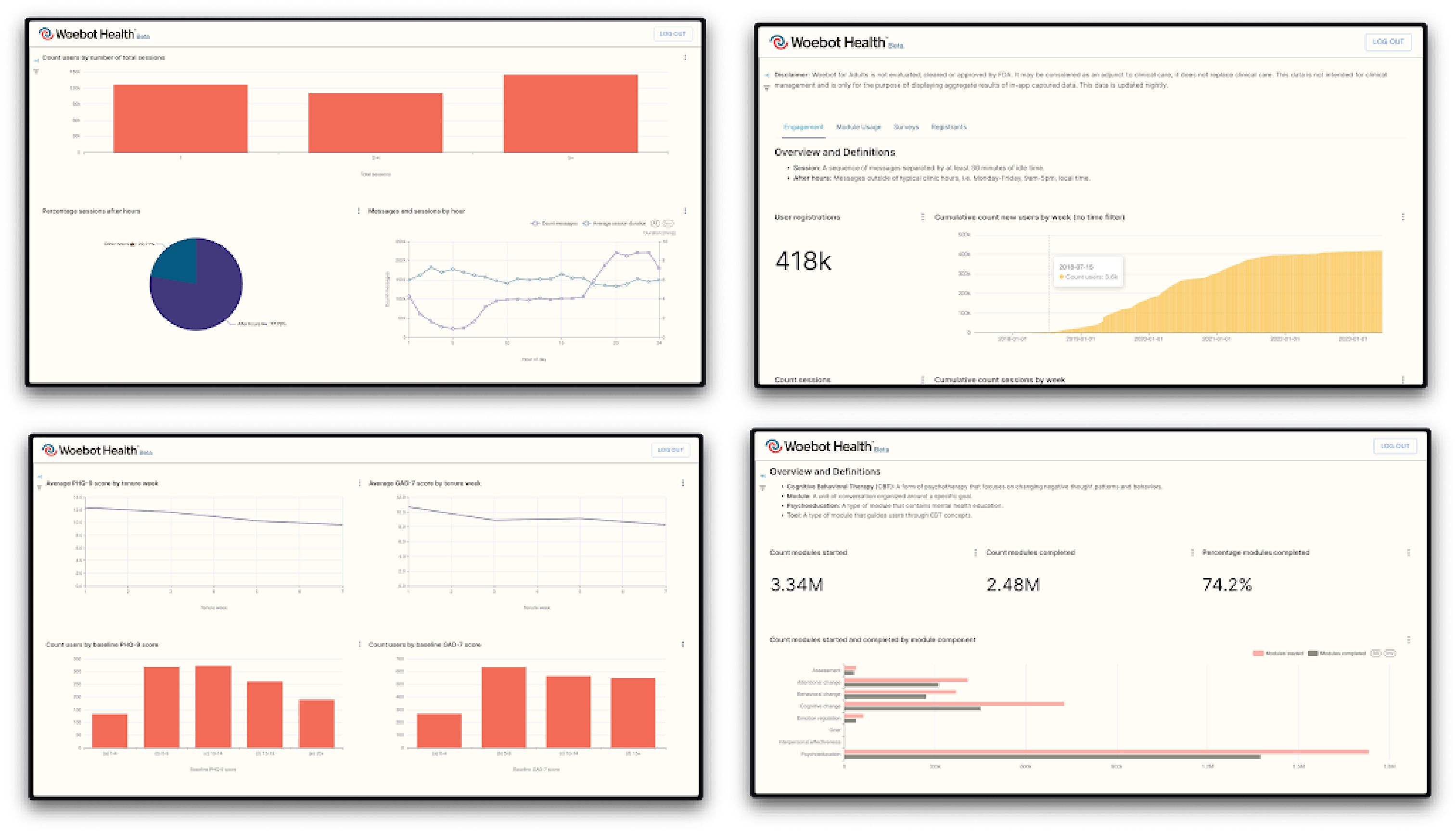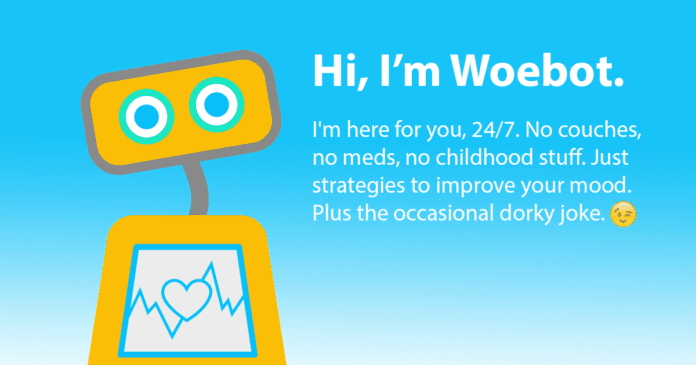In light of counselor shortages and rising patient demand, mental health professionals are resorting to AI-powered chatbots to assist in patching in the voids. However, not all chatbots are created alike; some may be damaging or unsuccessful, while others may provide helpful guidance. The AI-powered Woebot chatbot from Woebot Health offers mental health support. The task involves safeguarding individuals from detrimental guidance while securely utilizing artificial intelligence.
When counselors fail to show up, Woebot founder Alison Darcy views her chatbot as a helpful tool. According to Darcy, it can be challenging to get in touch with counselors at two in the morning if an individual is having an anxiety attack or is having trouble getting out of bed.
However, telephones are located there. She thinks we need to bring psychotherapy up to date.

Darcy claims that most of those needing assistance do not receive it because of waiting lists, healthcare restrictions, judgments, and expenses. Furthermore, the issue has gotten worse after the COVID-19 outbreak.
As Darcy stated, the question differs from how we draw patients into the medical facility. The question is, how can we get some of these technologies into the palms of individuals while getting them out of the clinic?
How chatbots driven by intelligence can assist therapy
In a way, Woebot functions as a portable counselor. It helps handle issues including anxiety, depressive disorders, dependence on drugs, and isolation through the usage of a chat feature.
Extensive specialized information training assists the application’s understanding of phrases, sentences, and emoticons linked to abnormal ideas. Woebot questions that way of considering, partly by imitating cognitive behavioral treatment, or CBT, a physical conversational therapy technique.
According to Woebot Health, Following the application’s launch in 2017, 1.5 million users have utilized it. Users can use the smartphone application through a healthcare provider or an employer insurance plan. Patients at Virtua Health, a charitable medical facility in New Jersey, can use it for free.

Leading medical analyst for CBS News, Dr. Jon LaPook, installed Woebot using a unique access code that the firm supplied. He then used the mobile application, pretending to be a depressed person. After receiving multiple cues, Woebot became curious about the deeper causes of his sadness. Dr. LaPook imagined a situation and confided in Woebot that he worried about the day his kid would move out.
He wrote, “I cannot do much concerning it now,” in response to one question. When the time comes, I will deliberately choose to “jump the wall” rather than “go over the wall.”
Woebot sensed that Dr. LaPook might be experiencing a significant problem based on his speech choice and suggested that he call specialist helplines.
It failed to generate a response to think about seeking additional assistance when you said, “Just leap that bridge,” without adding, “I am unable to do much about it now.” Woebot is not perfect, but similar to an actual human counselor. Therefore, you should not depend on it to determine whether or not a person is suicidal.
According to computational researcher Lance Eliot, who specializes in artificial intelligence and mental wellness, intelligence can understand subtleties in speech.
In some way, it may entirely and mathematically determine the fundamental characteristics of words and their relationships with one another. According to Eliot, it pulls from a wide range of facts. After that, it reacts to you in response to your commands, queries, or other cues from you.
The framework needs to go someplace to provide sufficient responses to function. Regulatory artificial intelligence systems, such as Woebot, are often closed. All the details they can answer come from their databases.

The staff professionals in psychology, physicians, and computer scientists at Woebot create and polish a database of studies from consumer feedback, medical journals, and other sources. In regular distant webinars, writers draft responses and inquiries. The developers at Woebot translate such discussions into programs.
The system can produce unique answers using generative artificial intelligence by incorporating data from the global web. Artificial intelligence generative can be less dependable.
Artificial intelligence chatbots’ drawbacks for mental health
Tessa, the AI-powered chatbot operated by the National Eating Disorders Association, was removed after giving possibly harmful advice to those needing assistance.
A clinical psychologist at Washington University School of Medicine who specializes in eating disorders studied St. Louis; Ellen Fitzsimmons-Craft headed the team that created Tessa, a chatbot to avoid eating disorders.
She stated that the platform she worked on was closed, and the engineers had yet to plan for the chatbot to offer guidance. However, that was not the case when Sharon Maxwell tried it.
Maxwell questioned Tessa about how it assists those who suffer from eating disorders. Maxwell was in therapy for a disorder of eating and has since become a spokesperson for others. Tessa gave a good introduction, stating that it may help people obtain information and exchange strategies for coping.
But Tessa began to give Maxwell advice that differed from standard recommendations for an eating disorder sufferer as long as Maxwell continued. For instance, it is recommended to reduce caloric intake, and the body’s composition can be measured with instruments like a skinfold meter.
When the average person sees it, they may assume those are standard recommendations. Say, according to Maxwell, cut back on the amount of sugar you consume or consume whole foods. However, that can be extremely harmful to someone who has an eating problem because it can quickly lead to significantly more disorganized behaviors.
The National Eating Disorders Association published a profile of Tessa on its official website when she described the matter to it. It quickly brought Tessa to her knees.
Fitzsimmons-Craft claimed the issue started after Tessa’s partner, Cass, took control of the software development. She claims Cass clarified why the damaging tweets surfaced when users started utilizing Tessa’s Q&A option.
Fitzsimmons-Craft stated that according to her knowledge regarding what went erroneous, the system they were using may have had generative artificial intelligence capabilities at a particular time. To learn more regarding this, you should speak with Cass. Therefore, based on my best guess, this application also has these additional capabilities.
Several efforts for clarification from Cass went unanswered.
Rules-based chatbots have flaws of their own.
According to Monika Ostroff, a clinical social worker who oversees a charitable organization that addresses eating disorders, they are predicting. Who wishes to repeatedly type an identical thing and get the same response in the same language?
When Ostroff learned from patients about the events that were taking place with Tessa, she began creating her chatbot. She began to doubt the use of artificial intelligence in mental health treatment. She expressed concern that therapy would lose its core component of being situated in a space alongside someone else.
According to her, individuals can heal via interaction. According to Ostroff, a machine is unable to do so.
Future employment of artificial intelligence in treatment
In contrast to licensed psychotherapists in the states in which they work, the majority of mental health applications are essentially unregistered.
According to Ostroff, there should be limitations on artificial intelligence-powered mental health solutions, particularly chatbots. According to Ostroff, it cannot be an internet-based chatbot.
Despite the possible drawbacks, Fitzsimmons-Craft is open to utilizing artificially intelligent chatbots for treatment.
According to Fitzsimmons-Craft, the truth lies in the fact that 80 percent of people with these issues have yet to receive any assistance. Furthermore, technology provides a solution—not the sole one, just one.




